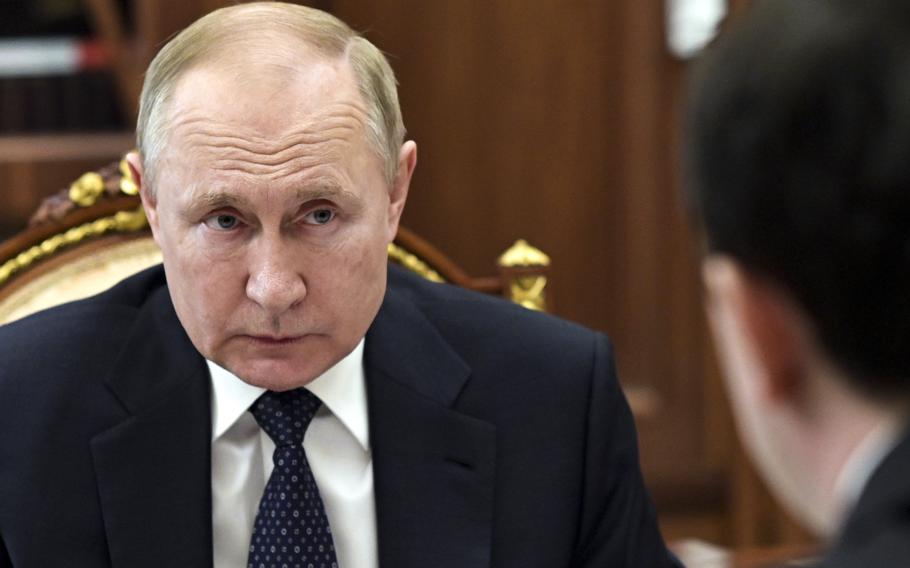Europe
No breakthrough, but Ukraine-Russia talks in Turkey stir optimism
The Washington Post March 29, 2022

Russian President Vladimir Putin attends a meeting in Moscow, Russia, Tuesday, March 29, 2022. (Mikhail Klimentyev, Sputnik, Kremlin Pool Photo via AP)
ISTANBUL - Ukrainian negotiators in Istanbul said Tuesday they had offered a detailed peace proposal to their Russian counterparts, exchanging military neutrality for security guarantees, as Moscow said it would “drastically reduce” military activity near the Ukrainian cities of Kyiv and Chernihiv “to increase mutual trust and create the necessary conditions for further negotiations.”
The declarations from the two sides, after hours of negotiations in an ornate palace on the Bosporus strait hosted by Turkish President Recep Tayyip Erdogan’s government, signaled a moment of rare optimism - if not a breakthrough - after weeks of halting negotiations that have done nothing to slow the bloody and intensifying conflict in Ukraine.
The centerpiece of the Ukrainian proposal was a pledge that it would maintain the kind of military neutrality sought by Moscow, in exchange for a security system for Ukraine guaranteed by international partners including the United States, Turkey and others. Ukrainian negotiators likened the offer to Article 5 of NATO’s charter, which ensures the alliance’s collective defense.
The guarantor parties - including European countries, Canada and Israel - would provide Ukraine with military assistance and weapons if it were attacked, the negotiators said. Ukraine, in turn, would ensure it remained “nonaligned and nonnuclear,” although it would retain the right to join the European Union.
The Ukrainian proposal also offered a 15-year timeline for negotiations with Russia over the status of Crimea, the Ukrainian peninsula annexed by Moscow in 2014.
Vladimir Medinsky, Russia’s lead negotiator, characterized the talks to reporters afterward as a “substantive conversation.” Mevlut Cavusoglu, Turkey’s foreign minister, said “the most meaningful progress since the start of negotiations was made today.”
Reactions by the United States to the day’s events were mixed. Secretary of State Antony Blinken expressed skepticism about the talks in Turkey, saying Moscow’s continued military offensive leaves little room for optimism. “There is what Russia says and what Russia does: We’re focused on the latter, and what Russia has been doing is the brutalization of Ukraine and its people,” Blinken said during a joint news conference with his Moroccan counterpart in Rabat, the Moroccan capital.
But the Pentagon’s top general overseeing U.S. troops in Europe said at a Senate Armed Services Committee hearing Tuesday that there was evidence of “shifting dynamics” on the ground near the Ukrainian capital, Kyiv, appearing to confirm that some Russian forces in the region are pulling back.
The change in Russian posture comes after Ukrainian forces have gone on the offensive in several parts of the country. Ukrainian officials said Monday that they have recaptured Irpin, a Kyiv suburb.
In Istanbul, the delegations from Ukraine and Russia arrived in convoys at the Dolmabahce Palace about 9 a.m. local time. Erdogan, addressing the delegates, expressed hope that the negotiations would lead to a cease-fire and said “the whole world is waiting for benevolent and good news from you.” Turkey, which for a multitude of reasons including economic, depends on close relations with both Moscow and Kyiv, has thrust itself into the middle of negotiations to halt the war.
Before Tuesday’s talks, Russia and Ukraine had sought to temper hopes of a breakthrough, after high-level negotiations in southwestern Turkey this month and weeks of talks via video link failed to produce an agreement. Ukrainian Foreign Minister Dmytro Kuleba told local media outlets Monday that Kyiv’s goal is - at best - a “sustainable” cease-fire. Meanwhile, his Russian counterpart, Sergei Lavrov, said Moscow should “stop indulging” Kyiv.
Outside the palace, the international press corps, barred from the meeting hall, crowded on a narrow sidewalk, perching laptops on shrubbery and watching convoys of delegations roll in while waiting for dribbles of news. Inside the hall, a sighting of Roman Abramovich, a Russian oligarch who faces sanctions in Europe, added to the intrigue surrounding the proceedings: A day earlier, an associate of Abramovich said the oligarch suspected he was poisoned at a previous round of talks, along with members of the Ukrainian delegation.
The Kremlin denied any connection to the alleged incident. Russian presidential spokesman Dmitry Peskov dismissed it Tuesday in a conference call with reporters as “part of the information sabotage” of the West. But in comments to a Ukrainian news channel, Ukrainian Foreign Minister Dmytro Kuleba advised anyone at the negotiations “not to eat or drink anything, and preferably avoid touching any surface.”
In comments to reporters early Tuesday afternoon, Ukrainian delegates said any agreement struck with Moscow would be subject to a popular referendum. Some of the thorniest issues, including the status of Ukrainian regions occupied by Russia, would have to be worked out by the presidents of Russia and Ukraine, they said.
But Ukrainian negotiators suggested Tuesday that the day’s events had provided a possible path forward. Oleksandr Chaly, a member of Ukraine’s delegation, said talks with Russia would continue in the next two weeks. Consultations have already begun with the guarantor countries, which could be invited to send representatives to the upcoming negotiations, he said.
After the Ukrainian and Russian leaders reach a “final agreement,” they would hold a multilateral conference, where a deal would be signed, Chaly said. He said “high officials from the guarantor countries” would participate in the conference.
Stern reported from Mukachevo, Ukraine, and Lamothe from Washington. The Washington Post’s John Hudson in Rabat, Morocco, and Annabelle Timsit and Zeynep Karatas in Istanbul contributed to this report.